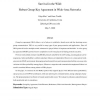Free Online Productivity Tools
i2Speak
i2Symbol
i2OCR
iTex2Img
iWeb2Print
iWeb2Shot
i2Type
iPdf2Split
iPdf2Merge
i2Bopomofo
i2Arabic
i2Style
i2Image
i2PDF
iLatex2Rtf
Sci2ools
104
Voted
ICISC
2008
2008
Survival in the Wild: Robust Group Key Agreement in Wide-Area Networks
Group key agreement (GKA) allows a set of players to establish a shared secret and thus bootstrap secure group communication. GKA is very useful in many types of peer group scenarios and applications. Since all GKA protocols involve multiple rounds, robustness to player failures is important and desirable. A robust group key agreement (RGKA) protocol runs to completion even if some players fail during protocol execution. Previous work yielded constant-round RGKA protocols suitable for the LAN setting, assuming players are homogeneous, failure probability is uniform and player failures are independent. However, in a more general widearea network (WAN) environment, heterogeneous hardware/software and communication facilities can cause wide variations in failure probability among players. Moreover, congestion and communication equipment failures can result in correlated failures among subsets of GKA players. In this paper, we construct the first RGKA protocol that supports players with d...
| Added | 29 Oct 2010 |
| Updated | 29 Oct 2010 |
| Type | Conference |
| Year | 2008 |
| Where | ICISC |
| Authors | Jihye Kim, Gene Tsudik |
Comments (0)

